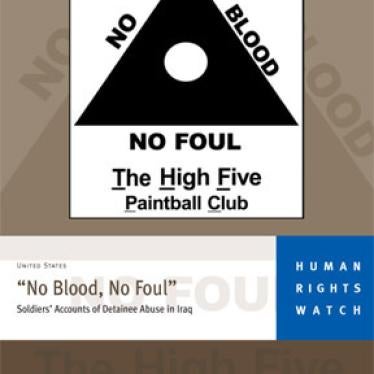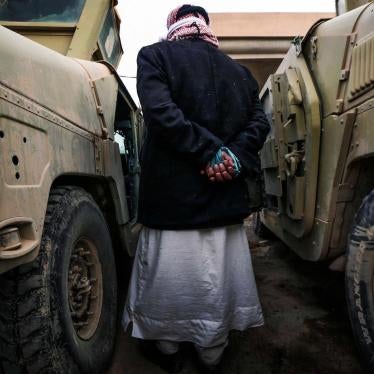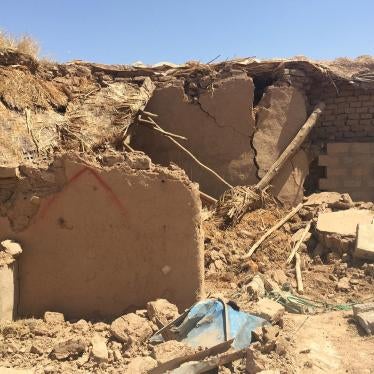Human Rights Watch repeatedly gave U.S.-led coalition forces in Iraq detailed information about massive stockpiles of unsecured explosives and munitions located throughout the country, but coalition forces took little or no action to secure the stockpiles. In May 2003, Human Rights Watch provided U.S. and British forces with specific data, including precise GPS coordinates, on unsecured weapons stockpiles around Baghdad and in Basra.
“Immediately after the fall of Baghdad, our researchers were finding massive stockpiles of weapons and explosives throughout Iraq," said Kenneth Roth, executive director of Human Rights Watch. "But when we informed coalition forces, they told us they just didn’t have enough troops to secure these sites."
On May 9, 2003, a Human Rights Watch researcher encountered a massive stockpile of warheads, anti-tank mines, anti-personnel mines, and other weaponry at the unsecured Second Military College, located on the main road between Baghdad and Baquba. Among the weaponry were hundreds of high-explosive surface-to-surface warheads for the ASTROS multiple rocket launcher system, packing 26 kilograms of high explosives each. The weapon stocks were in the process of being looted.
Concerned about the safety of the displaced persons at the military college, the researcher immediately went to the Coalition Provisional Authority in Baghdad and reported the weapons stockpile, showing U.S. military officials photographs of the weaponry, giving the exact GPS coordinates of the site, and showing the location of the site on a military map. The researcher repeatedly returned to the "Green Zone" over the next days to report continuing looting at the site, but U.S. coalition forces did not move to secure the site.
The road between Baghdad and Baquba is now one of the main locations for attacks using “improvised explosive devices” (IEDs) against passing coalition troops and Iraqi security forces. Typically, suicide bombers and IEDs involve between 25 to 200 kilograms of high explosives.
U.S. troops were not the only ones who failed to secure weapon dumps. Also in May 2003, a Human Rights Watch research team located 20 trucking containers packed with anti-aircraft shells, mortar rounds, rocket-propelled grenades and Katyusha rockets near the old airport in Basra. The team approached the British troop contingent stationed nearby and asked them to secure the site, as civilians were looting the site and being injured. Even though the site was less than one kilometer away from the headquarters of the British First Fusilliers Battle Group, the British forces failed to secure the site.
British officers told Human Rights Watch that they did not have sufficient troops in Basra to guard abandoned munitions sites in addition to performing their other duties. (see https://www.hrw.org/press/2003/05/iraq050603.htm).
Human Rights Watch has no information about the weapons cache in al-Qaqa`a, from which explosives were reportedly looted, but witnessed a pattern of similar events throughout the country.
Even in volatile Falluja, U.S. troops seemed oblivious of the weapons being sold openly in the town. On May 5, 2003, shortly after the first deadly clashes between U.S. coalition troops and residents of Falluja, Human Rights Watch researchers visited weapons markets operating openly in Falluja, where buyers were testing AK-47 assault rifles and heavy .50 caliber machine guns by firing them openly in the air. Rocket-propelled grenades and regular grenades were also being sold openly. When the researchers asked U.S. intelligence officers at the main U.S. base in Falluja about the weapon markets, they were unaware of their existence.
"While the U.S.-led coalition deployed more than 1,000 people to search for weapons of mass destruction, they weren’t organized to neutralize the threat of conventional weapons right under their noses," said Roth. “Now Iraqi civilians are paying a deadly price for the failure to secure the vast weapon stocks in Iraq during the U.S.-led invasion.”







